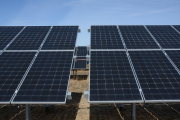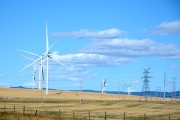Alberta's recently released Nuclear Power Expert Panel report calls for a "debate" of the "relative risks/benefits (of nuclear energy) compared with alternatives." But the panel views nuclear energy through an uncritical lens and offers only a cursory and selective overview of the burgeoning array of green options already being deployed in the United States, Europe and other Canadian provinces.
Given Alberta's vast renewable energy resource and massive global investments in renewable power, Albertans deserve a serious evaluation of green energy as a huge economic opportunity and a viable choice for future energy supplies.
While Alberta has no experience with large-scale nuclear power generation, it does have experience with renewable power. In fact, Alberta was the Canadian leader in wind power until 2008 when Ontario took the lead and renewable energy investors began to look beyond Alberta's borders.
This need not be the case. A study by the Pembina Institute found that Alberta could go from producing over 70 per cent of its electricity from coal to 70 per cent from clean energy sources in just 20 years based on existing technology and rates of deployment already seen in other jurisdictions.
Using proven renewable energy technologies combined with industrial co-generation and a serious commitment to improved consumption efficiency, Alberta could satisfy its growing demand for power while dramatically reducing greenhouse gas emissions and other harmful environmental impacts. Alberta does not need a single new coal-fired or nuclear power plant even if its demand for power doubles in the next 20 years.
The green energy economy is gaining momentum globally and Alberta risks being left in the dust. With 2.3 million jobs worldwide, renewable energy is expected to be a trillion dollar industry by the year 2020. Realizing this green energy potential requires vision, commitment and investment. President Obama has committed the United States to an investment of $26.7 billion in renewable energy to begin the process of securing, transforming and cleaning up the American energy economy.
There are already more people employed in wind power in the United States than coal mining, and huge investments by the Obama administration in renewables are likely to further increase this disparity.
While it is true that the wind doesn't always blow, many countries have already demonstrated how to integrate large amounts of renewable power without major changes to their grids. Some islands are already operating on 100 per cent renewable power. Alberta's grid operators are smart enough to be able to replicate what has already been done elsewhere.
In Canada, Ontario is leading the way with its Green Energy Act, adopting the German model for growing a green energy economy. Private sector enthusiasm for renewables in Ontario has already been overwhelming. When Ontario issued a request for proposals, businesses responded with ten times as many wind, biomass, solar and other renewable projects as expected. In Alberta, investors have billions of dollars on the table, with more than 11,000 MW of wind projects at various stages of planning.
A majority of Albertans understand that green energy offers a ‘win-win' for the economy and the environment. Polls consistently indicate high - greater than 70 per cent - support for developing renewable energy. In an Ipsos-Reid poll released just last week, 78 per cent of Albertans surveyed said they are in favor of the government providing subsidies to renewable energy, as opposed to continuing past practice of subsidizing the oil and gas industry. In spite of this, the Government of Alberta has never given any financial assistance to renewable energy development.
No energy supply is a magic bullet and all have their impacts. But some are cleaner, less costly, and a lot less risky than others. Not one of 20 nuclear reactors built in Ontario has been completed on budget or on time and total cost overruns topped $14 billion.
Alberta has an incredible opportunity to transform its "brown" electricity system - the dirtiest in Canada - to a clean, green, competitive system of the future, but Albertans must have all the information in front of them before making a decision on their province's electricity future.
With the nuclear expert panel report in, Premier Stelmach should take the logical and prudent next step by establishing an expert renewable energy task force to carefully examine these growing energy sources. Then Albertans will have the information they require to look critically at both nuclear and green energy and choose the future energy supply that makes the most sense for Alberta.
Steve Kennett, Senior Policy Analyst
Tim Weis, Director of Renewable Energy and Efficiency Policy
Download the report, Greening the Grid, Powering Alberta's Future With Renewable Energy.





